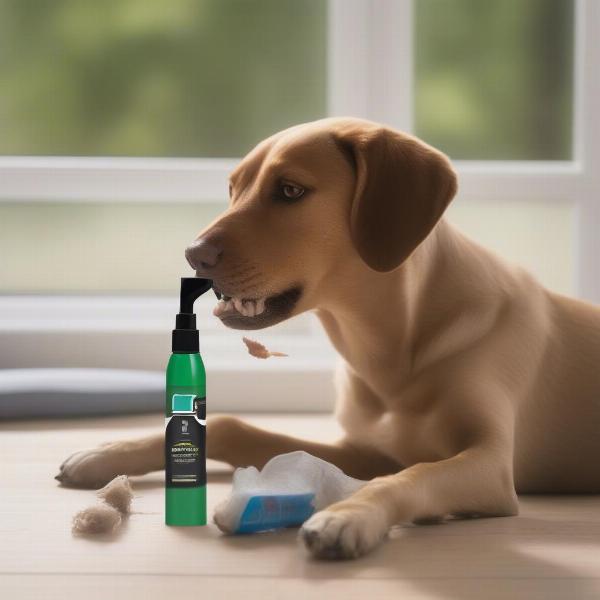Sprays for dogs encompass a wide range of products, each designed for specific purposes, from deterring unwanted chewing to repelling insects and treating skin conditions. Choosing the right spray depends on your dog’s individual needs and the specific problem you’re addressing. This guide explores the different types of sprays available, how to use them safely and effectively, and important considerations to keep in mind.
Understanding Different Types of Sprays for Dogs
There are various sprays available for dogs, catering to a range of needs. Let’s delve into some common categories:
Citronella Sprays: A Humane Deterrent
Citronella sprays are often used as a training aid to deter unwanted behaviors like barking or chewing. The scent of citronella is unpleasant for dogs, discouraging them from engaging in the undesired action.
Dematting Sprays: For Easy Grooming
Dematting sprays help loosen tangled fur, making grooming easier and less painful for your dog. These sprays typically contain conditioning agents that soften the hair and make it easier to brush through knots and mats.
Insect Repellent Sprays: Protecting Your Dog from Pests
Insect repellent sprays are crucial for protecting your dog from fleas, ticks, mosquitoes, and other pests. These sprays typically contain ingredients like pyrethrins or permethrin, which are effective in repelling insects.
Chew Stopper Sprays: Protecting Your Furniture
Chew stopper sprays are designed to deter dogs from chewing on furniture, shoes, and other household items. These sprays often have a bitter taste that discourages chewing.
Antifungal Sprays: Addressing Skin Issues
Antifungal sprays are used to treat fungal infections on a dog’s skin. These sprays typically contain antifungal medications that help clear up the infection.
Choosing and Using Sprays Safely
When choosing a spray for your dog, consider the following factors:
- Your dog’s age and size: Puppies and smaller dogs may require specially formulated sprays.
- The specific problem you’re addressing: Choose a spray designed for the intended purpose.
- Ingredients: Always check the ingredients list to ensure the spray is safe for your dog and doesn’t contain any harmful chemicals.
- Vet recommendation: Consult your veterinarian before using any new spray, especially if your dog has sensitive skin or any underlying health conditions.
Applying Sprays Correctly
- Follow the instructions: Always follow the manufacturer’s instructions carefully.
- Avoid contact with eyes and mouth: Be careful not to spray the product near your dog’s eyes or mouth.
- Test on a small area: Before applying the spray to a large area, test it on a small patch of skin to check for any adverse reactions.
What if My Dog Licks the Spray?
While most sprays are formulated to be safe if ingested in small amounts, excessive licking can cause gastrointestinal upset. If your dog licks the spray, monitor them for any signs of vomiting, diarrhea, or lethargy. If you notice any concerning symptoms, contact your veterinarian immediately.  Chew Stopper Spray for Dogs
Chew Stopper Spray for Dogs
Conclusion: Choosing the Right Spray for Your Canine Companion
Choosing the right spray for your dog can significantly improve their health, well-being, and behavior. By understanding the different types of sprays available and following safe usage guidelines, you can ensure you’re making the best choice for your furry friend. Always consult with your veterinarian if you have any concerns or questions about using sprays on your dog.
FAQs:
- Are dog sprays safe for all breeds? Most sprays are safe for all breeds, but always check the label for specific recommendations and consult your vet if your dog has sensitive skin.
- How often can I use a spray on my dog? Follow the manufacturer’s instructions. Overuse can lead to skin irritation or other problems.
- What should I do if my dog has an allergic reaction to a spray? Stop using the spray immediately and contact your veterinarian.
- Can I use human insect repellent on my dog? No, human insect repellents can be toxic to dogs. Always use a spray specifically formulated for dogs.
- Are citronella sprays effective for all dogs? While generally effective, some dogs may not be deterred by the scent of citronella.
- Can I make my own dog spray? While possible, it’s recommended to use commercially available sprays formulated for dogs to ensure safety and efficacy.
- Where can I buy dog sprays? Dog sprays are available at pet stores, veterinary clinics, and online retailers.
ILM Dog is your one-stop resource for expert advice on all aspects of dog care, from breed selection and health to training, nutrition, and grooming. We offer practical, reliable information for dog owners worldwide. For further assistance, reach out to us at [email protected] or call us at +44 20-3965-8624. ILM Dog is committed to providing the best resources to help you care for your canine companion.